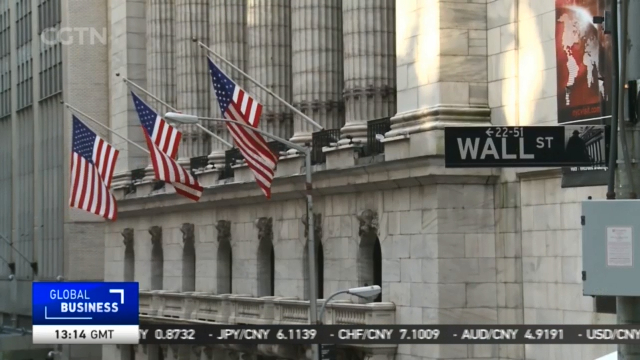
22:02, 14-Sep-2018
Financial Crisis: Ten years on, what have we learned?
Updated
21:48, 17-Sep-2018
05:05

The 15th of September marks ten years to the day since the financial services company Lehman Brothers filed for bankruptcy protection in the US. It was the moment the world woke up to the fact that something was very wrong and a global financial meltdown was potentially looming. CGTN's John Terrett reports.
September 2008, just ten years ago, but in many ways a lifetime away. There were rumors something was wrong in the U.S. housing market. A handful of economists spoke up, but their warnings were mostly ignored. In March 2008 the investment bank Bear Stearns went under, but things really began to hit home on September 15th, 2008 when the financial services company Lehman Brothers filed for bankruptcy protection and the world suddenly realized some banks and big corporations were being less than truthful about the health of their balance sheets and a global financial meltdown was in the offing.
JOHN TERRETT NEW YORK "And this is where it all began at the junction of 49th and Seventh Avenue. This is the building that used to house Lehman Brothers. It's Barclays now, but I remember thinking to myself at the time, the government will never let Lehman go. It's too big. How wrong can you be?"
"The press photographers are in the gallery up there and you're here at this post with your head in your hands, you made the papers the next day!"
"I did, I did!"
Peter Tuchman's known as the most photographed trader on Wall Street. He's been here thirty-three years and says he was surprised as anyone when Lehman Bothers collapsed.
PETER TUCHMAN QUATTRO M SECURETIES "I need you to know, there was anxiety. There was fear and there was doom. For about a year here it changed the whole flora of the financial industry. The next day there were people walking round with boxes leaving work. 25,000-plus people lost their jobs. Did I know that the day I was trading Lehman, no!"
So what was it that rattled the global economy so badly a decade ago? Bankers were selling what were known as sub-prime mortgages to people – many in poorer neighborhoods – failing to explain that the interest rates would double after two years. The sub-prime loans were sliced up, bundled with good ones, and sold to banks and governments around the world as investments called Collateralized Debt Obligations – and within those – it was impossible to know what was good debt and what was bad.
Banks like Lehman gorged themselves on these risky assets, thinking their potential losses would be covered by a type of insurance called Credit Default Swaps—a big mistake. When Lehman Brothers went bankrupt, the markets imploded. Some say the world came within a whisper of all-out global financial collapse. Within weeks Congress passed the TARP – the Troubled Asset Relief Program – a massive bailout by the U.S. Treasury to prop up banks, stabilize the financial system and restore economic growth.
"That means it's a one family house. It's not a two."
Loretta Hill shows me the New Jersey home she almost lost in the aftermath after the crash. She blames mortgage lenders for approving her for a loan that she says they knew she'd never be able to repay on her salary.
LORETTA HILL HOMEOWNER "Can you imagine everyday waking up and all you're getting is letters saying you've got to go for foreclosure. You're not understanding the legal terminology. You got kids. You have no money, you know. It's overwhelming. You don't know what to do. You're having a nervous breaking down. I was emotionally shattered."
Ten years on what's changed to prevent a similar crisis from happening again? At the New York Stock Exchange Peter Tuchman is confident new rules mean things are more open now than ten years ago.
PETER TUCHMAN QUATTRO M SECURETIES "No, I don't see it happening now. I don't see it happening here. I think people are a little more transparent now. I think the market with all the potential anxiety over the last couple of years –in particular, we're still at 26,000 – the market tells you what it thinks about what's going on. This is real money in real time."
But, at New Jersey Citizen Action, financial justice advocate Beverly Brown Ruggia, is not quite so optimistic. She says the Trump administration is turning its back on legislation designed to protect the consumer rather than big business.
BEVERLY BROWN RUGGIA NEW JERSEY CITIZEN ACTION "The Dodd- Frank Wall Street Reform and Consumer Protection Act was passed after the crash and it included a provision to create the Consumer Financial Protection Bureau, specifically charged with protecting the little guy. Unfortunately, the leadership in Washington and the administration and the new director don't really believe in that mission. They're no longer putting the little guy above the interests of industry."
Loretta knows all too well what that feels like, and can't believe there's a chance it could happen again to others.
LORETTA HILL HOMEOWNER "Why would you do that? Why would you want to do that? It's like we don't matter. We didn't matter at the time. They just wanted to get the mortgages and they didn't care about the people."
John Terrett, CGTN, New York.

SITEMAP
Copyright © 2018 CGTN. Beijing ICP prepared NO.16065310-3
Copyright © 2018 CGTN. Beijing ICP prepared NO.16065310-3